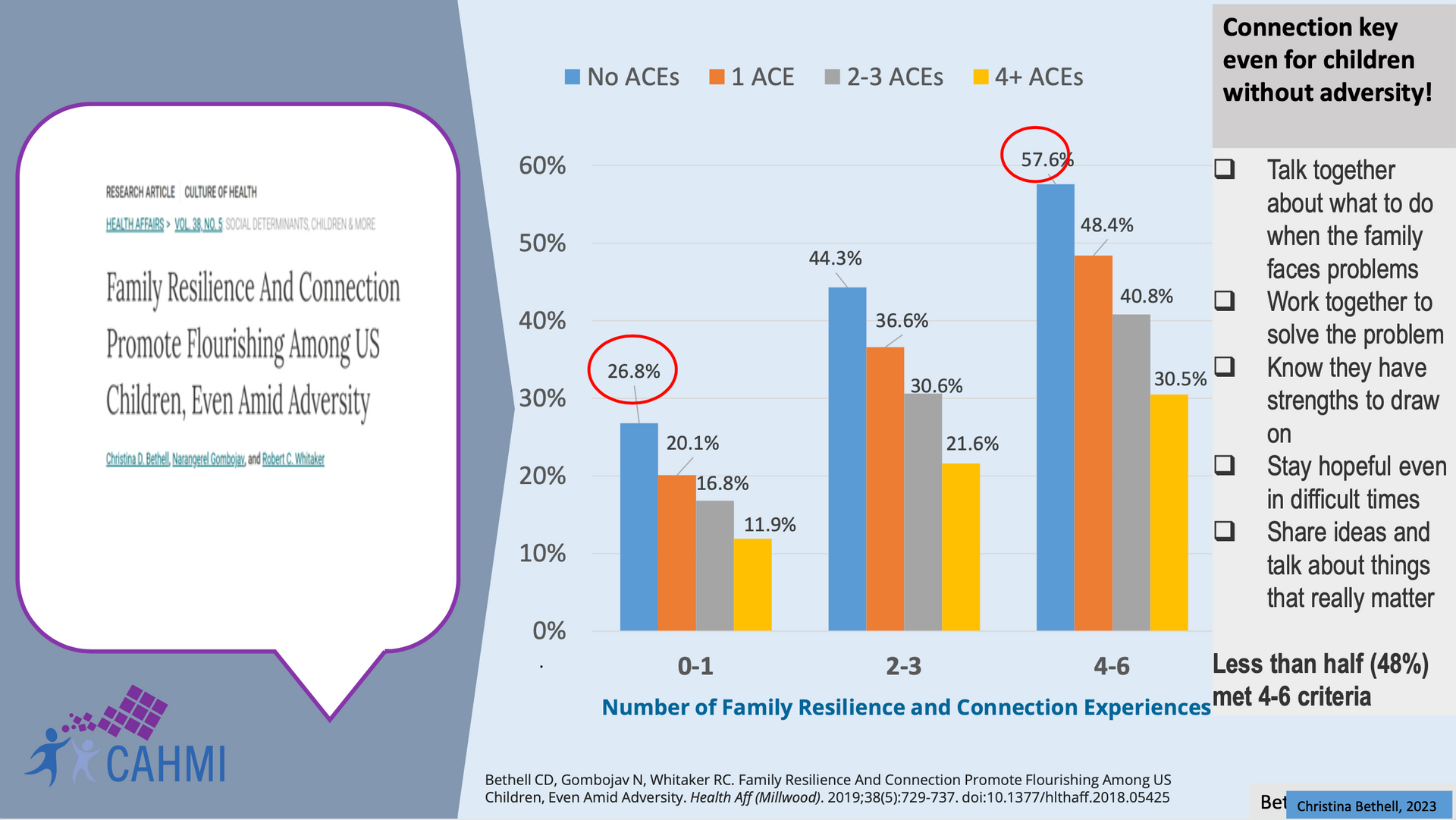We know that social risk factors and traumatic experiences like abuse, neglect, and witnessing violent take a serious toll on the developing mind of a child - promoting poor health outcomes that can last a lifetime. Traumatic stress in childhood is correlated with drastic increase in the likelihood of unplanned pregnancy, incarceration, dropping out of school, attempted suicide, mental illness, and chronic disease.
Researchers have performed ample studies in the hopes of finding a solution - both to prevent the heartache of trauma to begin with, and provide a clear process of healing for those affected. Successful treatments have been developed to aid in alleviating the symptoms related to trauma in the lives of many families. See Residential Treatment, Trauma Informed Care, or Trauma Focused CBT Therapy for examples.
But there is also a solution that is readily available to all families, regardless of social or economic status, culture, or religion:
Connection and Belonging is the Best Medicine
Over 70 years of research supports that promoting Positive Childhood Experiences offers a child a drastically higher chance at a quality life - regardless of the negative experiences they've endured in their life:

At each increasing level struggle with adverse childhood experiences, household income, and special health care needs, the prevalence of flourishing increased in a graded fashion as the levels of family resilience and connection increased.
In simple terms: This study supports that the more connected a child is with a few people around them, the more capable they will be of experiencing a flourishing, healthy childhood and adulthood.
Flourishing
Let's back up a minute. What do we mean by flourishing?
By definition, flourishing means healthy growth, thriving, and feeling positive about life. In youth, psychiatrists recognize three indicators that a child is flourishing, that also indicate that a child is school-ready:
- They are showing interest and curiosity about learning new things.
- They are persistent and able to complete tasks.
- They have the capacity to regulation their emotions.
Think about these factors in the workforce. Do you know anyone who is not flourishing by these standards? Are they disinterested in their job? Unable to complete tasks or regulate their emotions?
These skills are developed in our youth and follow us throughout our entire careers. They're fundamentally essential to enjoying a high quality of life - so how do we develop and protect them?
Connection & Belonging
When performing the previously mentioned study, they measured a child's ability to flourish when faced with varying levels of both adverse and positive childhood experiences. The positive experiences they decided on boiled down to a few "actionable takeaways" that every family can incorporate into their day-to-day life now.
Key Experiences in a Child's Life:
- Feeling able to talk to their family about feelings
- Feeling their family stood by them during difficult times
- Talking about important things with their family
- Praise your child when they does something well
- Enjoyed participating in community traditions
- Christmas, Fairs, 5ks, etc.
- Feeling a sense of belonging in high school (not equate to popularity)
- Being greeted by a friend or teacher
- Having a teacher or staff member who talks to them regularly
- Feeling supported by friends
- Had at least two non-parent adults who took genuine interest in them
- This could be coaches, teachers, family members, or friends
- Feeling safe and protected by an adult in their home
The beauty of these takeaways is that they don't require a parent to be perfect, have a lot of money or resources, or be highly educated to provide a quality life to their child. These things don't have to happen 7/7 every day for a child to have a chance - they just need to happen consistently throughout their years of development.
The Flourishing Adult

Let's shift from children to you: Do you feel like you aren't flourishing in your adult years? Are you struggling with a mental illness like depression or anxiety? Do you feel lonely or withdrawn? What about stressed, finding it hard to sleep, lack of appetite, etc.?
If you experience feelings like these consistently, we would encourage you first and foremost to request an appointment with a clinical therapist - either with us or somewhere you already feel comfortable. Prolonged negative experiences like these can be indicators towards a deeper mental health concern that a therapist will be able to help you with.
There is always hope: The same metrics and experiences that are shown to improve a child's ability to flourish can also improve yours. Do you have one or two non-parental adults who care about you? Meet with them. Do you not have someone? Look for people who are ahead of you in your work force or family that you could ask to coffee!
Mentors are a great asset to have. A speaker once quoted that mentors are the next step to get through the next step - find one, but if there's no one around - find a good book. Many of our current and past generation's best minds have recorded their thoughts in writing for people like you.
There are ample opportunities to foster a sense of connection in and out of the home and workplace. Spend quality time with your non-offending family members, have important conversations, enjoy community traditions or create your own!
Be the person who cares for and creates these positive experiences for someone else. For more ideas, visit:





